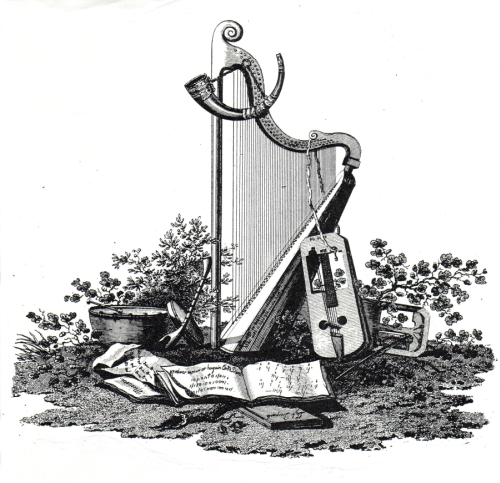The National Eisteddfod, Wales’ largest festival of culture, music, dance and literature, will be held in Ynysangharad War Memorial Park in the town of Pontypridd on August 3-10, 2024 – and historians and musicians have been and will be marking the famous 19th Century Aberdare harper and prolific composer Thomas David Llewelyn, who took the bardic name Llewelyn Alaw.
He was born on June 25, 1828 in Llwydcoed, Aberdare in the modern county of Rhondda Cynon Tâf, the son of David and Martha Llewelyn, who had learned to play the harp by the time he was eight. He started work at the age of 11 with his collier father but left the coalmine in 1851 and devoted his whole time to music, poetry and literature.
He became the official harper to the Williams family of Aberpergwm in the Vale of Neath and to Lord Aberdare. Maria Jane Williams was to grow up a passionate supporter of the Welsh language and traditions, and in 1844 went on to publish a collection of Welsh folk songs under the heading The Ancient National Airs of Gwent and Morgannwg; the Abergavenny National Eisteddfod awarded her a prize.
In the historical document Gardd Aberdâr, there is an essay by him on the history of Aberdare. At the Llangollen National Eisteddfod, 1858, he won the prize for the best collection of unpublished Welsh airs, and this 11-volume collection is now housed in the National Library of Wales in Aberystwyth. Llewelyn Alaw was considered an excellent harper and a very good instructor, and he also won several Eisteddfod prizes. He died on August 13, 1879, and was interred in the Hen Dŷ Cwrdd burial ground in Trecynon, Aberdare.
The celebrated triple harper Robin Huw Bowen first flagged up and recorded Llewelyn Alaw’s work, and the South Wales duo Calennig recorded snatches of his wonderful music. Now, Llantrisant Folk Club chairman Mike Greenwood says that an incredible groundswell is happening in the restoration of the redundant meeting house and chapel Tŷ Cwrdd; musicians Jeff Jones and Rob Bradshaw are both currently immersed in the resurrection, publication and propagation of Llewelyn Alaw’s lost manuscripts and Christine Moore, Trust Manager of Addoldai Cymru – a team dedicated to the conservation and repurposing of redundant Welsh non-conformist chapels for community use – is leading the application of a grant and the building side of the projects. Mike says: “With Trecynon being within Rhondda Cynon Tâf, the host area to the 2024 National Eisteddfod, it’s a case of ‘No time like the Present’ to get this project kick-started.”
On Friday, December 15, a Candlelit Traditional Folk Christmas will be happening in the old meeting house and chapel at Hen Dy Cwrdd, Alma Street, Trecynon from 7pm-9pm. Cefn Crybwr Folk Club and Llantrisant Folk Club will be there, and the wonderful Llantrisant Mari Lwyd will put in an appearance. The event is free, but there will be a raffle – and donations will be accepted to raise funds for the National Eisteddfod in Rhondda Cynon Tâf 2024.
In Welsh culture and life, chapels became the beating heart of the community. Hen Dŷ Cwrdd is listed Grade II as the earliest Nonconformist cause in the Cynon Valley and represents the continuity of radical thought and action since the 17th century. It was originally known as Tŷ Cwrdd Godre Hirwaun – and is the Mother Church of Unitarianism in the Valley. Its origins extend back to the Dissenting Meeting Houses at Cwmyglo and Blaencanaid Farm on the mountainside between Aberdare and Merthyr Tydfil. As a result of divisions appearing among dissenters Hen Dŷ Cwrdd, Cefn Coed was founded in 1747 and Hen Dŷ Cwrdd, Trecynon was established in 1751.
The Chamber-folk trio VRï, writing in the notes of their second album Islais y Genir (A Sung Whisper), said that in a typical chapel you might stumble on a regular service, a wedding, a funeral, a temperance meeting, a Young People’s Society gathering, a Band of Hope practice, a four-hour-long sermon, a Sunday School, a ‘spiritual’ class, a children’s worship, a thanksgiving celebration or the grand celebrations of hymn singing in four-part harmony known as cymanfa ganu – however, religion made sure that all the Welsh traditional culture were lost. VRï say: “but whilst it succoured and inspired, Methodism also destroyed. Its Calvinistic heart looked on human vice with a stern and merciless eye, damning the old Celtic ways of drinking, dancing, fiddle playing, sports and riotous Saints Day celebrations to obscurity and oblivion.”
Llewelyn Alaw is responsible for many Welsh tunes, including the pretty three-part ‘Trefforest Waltz’, which is growing in popularity, ‘The Aberdare Polka’, ‘I Lawr a’r Francwyr’ (19th Century translation: Down With The French!), the gay jig ‘The Wheat Sheaf’ and toe-kicking ‘Polca y’r Faenor’. He should be honoured and remembered.
